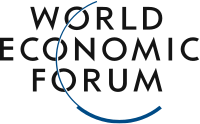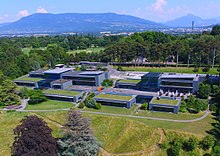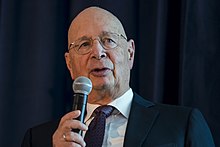
Back Wêreld- Ekonomiese Forum Afrikaans Weltwirtschaftsforum ALS المنتدى الاقتصادي العالمي Arabic Dünya İqtisadi Forumu Azerbaijani دونیا ایقتیصاد اوتورومو AZB Сусветны эканамічны форум Byelorussian Сусьветны эканамічны форум BE-X-OLD Световен икономически форум Bulgarian Dunia Sɔrɔko Forobakɛnɛ BM বিশ্ব অর্থনৈতিক ফোরাম Bengali/Bangla
This article has multiple issues. Please help improve it or discuss these issues on the talk page. (Learn how and when to remove these messages)
|
 | |
 Headquarters in Cologny, Switzerland | |
| Formation | 24 January 1971 |
|---|---|
| Founder | Klaus Schwab |
| Type | International NGO, lobbying organisation |
| Legal status | Foundation |
| Purpose | Influencing global agendas and decision making, lobbying for public-private cooperation |
| Headquarters | Cologny, Switzerland |
Region served | Worldwide |
Official language | English |
| Klaus Schwab | |
President | Børge Brende |
| Website | www |
Formerly called | European Management Forum |
The World Economic Forum (WEF) is an international advocacy non-governmental organization and think tank, based in Cologny, Canton of Geneva, Switzerland. It was founded on 24 January 1971 by German engineer Klaus Schwab.
The foundation's stated mission is "improving the state of the world by engaging business, political, academic, and other leaders of society to shape global, regional, and industry agendas".[1]
The foundation is mostly funded by its 1,000 member multi-national companies.[2]
The WEF is mostly known for its annual meeting at the end of January in Davos, a mountain resort in the eastern Alps region of Switzerland. The meeting brings together some 3,000 paying members and selected participants – among whom are investors, business leaders, political leaders, economists, celebrities and journalists – for up to five days to discuss global issues across 500 sessions.[citation needed]
Aside from Davos, the organization convenes regional conferences. It produces a series of reports, engages its members in sector-specific initiatives[3] and provides a platform for leaders from selected stakeholder groups to collaborate on projects and initiatives.[4]
The World Economic Forum and its annual meeting in Davos have received criticism over the years, including allegations of the organization's corporate capture of global and democratic institutions, institutional whitewashing initiatives, the public cost of security, the organization's tax-exempt status, unclear decision processes and membership criteria, a lack of financial transparency, and the environmental footprint of its annual meetings.[citation needed]

- ^ "Our Mission". World Economic Forum. Archived from the original on 21 July 2021. Retrieved 21 July 2021.
- ^ "RN Breakfast, 20th January 2023". ABC listen. 19 January 2023. Archived from the original on 18 October 2023. Retrieved 12 October 2023.
- ^ Pigman, Geoffrey Allen (2007). The World Economic Forum – A Multi-Stakeholder Approach to Global Governance. London: Routledge. pp. 41–42. ISBN 978-0-415-70204-1.
- ^ "Platforms". World Economic Forum. Archived from the original on 21 July 2021. Retrieved 21 July 2021.